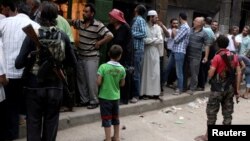Senior United Nations officials are pinning their hopes for humanitarian access to Aleppo and other hard-to-reach and besieged areas in Syria on a breakthrough in U.S.-Russia bilateral talks.
U.S. Secretary of State John Kerry and his Russian counterpart, Sergei Lavrov, are meeting in Geneva to try to reach a cessation of hostilities agreement on Syria.
U.N. agencies have been unable to deliver food and other humanitarian aid to more than a quarter-million people in eastern Aleppo since early July. All efforts so far have failed to get Syrian government and opposition forces to agree to a 48-hour humanitarian pause to allow aid convoys into the area.
U.N. Special Envoy for Syria Staffan de Mistura said the people of Aleppo are suffering enormously as they reach the end of their resources. He said it is crucial for the U.S. and Russia to break the impasse.
“If they do succeed … the conclusions could make — let us be frank — a major difference," he said. "One, on the renewal or relaunching of cessation of hostilities, which in turn … would have a major impact on humanitarian access and, in turn, would be having a positive impact on the way the political process could be relaunched.”
The last round of intra-Syrian peace talks was suspended in April because of intensified fighting. A target date for resuming them at the end of last month was missed because Washington and Moscow were not able to revive the cessation of hostilities agreement.
The United Nations had hoped to reach an estimated 1.2 million Syrians trapped in 18 besieged areas this month. To date, it only has managed to provide aid to some 25,000 people.
U.N. Emergency Relief Coordinator Stephen O’Brien said the situation in Aleppo is so dire it has become a de-facto besieged state.
"We need to make sure that we continue to press for and to demand a 48-hour weekly humanitarian pause to reach the people in need by whichever route can be made secure for those very brave and courageous aid workers both from the U.N. and our implementing humanitarian partners to reach the people in need," he said.
For now, U.N. officials acknowledge aid convoys are not rolling because of increased fighting and militarization of the conflict.




